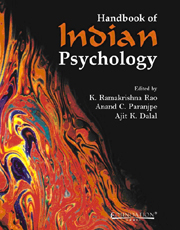Book contents
- Frontmatter
- Contents
- Contributing Authors
- Preface
- 01 Prologue: Introducing Indian Psychology
- 02 Indian Thought and Tradition: A Psychohistorical Perspective
- PART I SYSTEMS AND SCHOOLS
- 03 Jaina Psychology
- 04 The Foundations of Early Buddhist Psychology
- 05 Varieties of Cognition in Early Buddhism
- 06 A Buddhist Theory of Unconscious Mind (Ālaya-Vijñāna)
- 07 Indian Buddhist Theories of Persons
- 08 Buddhist Psychology: A Western Interpretation
- 09 Transpersonal Psychology in the Bhagavad-Gītā: Reflections on Consciousness, Meditation, Work and Love
- 10 Yoga Psychology: Theory and Application
- 11 Patañjali Yoga and Siddhis: Their Relevance to Parapsychological Theory and Research
- 12 Yoga Psychology and the, Sāṃkhyā Metaphysic
- 13 Psychology in the Advaita Vedānta
- 14 The Nyāya-Vaiśeṣika Theory of Perceiving the World of our Experience
- 15 Psychological Theories and Practices in Āyurveda
- PART II TOPICS AND THEMES
- PART III APPLICATIONS AND IMPLICATIONS
- Pronunciation and Transliteration of Sanskrit Alphabet
- Glossary
- Index
08 - Buddhist Psychology: A Western Interpretation
from PART I - SYSTEMS AND SCHOOLS
Published online by Cambridge University Press: 26 October 2011
- Frontmatter
- Contents
- Contributing Authors
- Preface
- 01 Prologue: Introducing Indian Psychology
- 02 Indian Thought and Tradition: A Psychohistorical Perspective
- PART I SYSTEMS AND SCHOOLS
- 03 Jaina Psychology
- 04 The Foundations of Early Buddhist Psychology
- 05 Varieties of Cognition in Early Buddhism
- 06 A Buddhist Theory of Unconscious Mind (Ālaya-Vijñāna)
- 07 Indian Buddhist Theories of Persons
- 08 Buddhist Psychology: A Western Interpretation
- 09 Transpersonal Psychology in the Bhagavad-Gītā: Reflections on Consciousness, Meditation, Work and Love
- 10 Yoga Psychology: Theory and Application
- 11 Patañjali Yoga and Siddhis: Their Relevance to Parapsychological Theory and Research
- 12 Yoga Psychology and the, Sāṃkhyā Metaphysic
- 13 Psychology in the Advaita Vedānta
- 14 The Nyāya-Vaiśeṣika Theory of Perceiving the World of our Experience
- 15 Psychological Theories and Practices in Āyurveda
- PART II TOPICS AND THEMES
- PART III APPLICATIONS AND IMPLICATIONS
- Pronunciation and Transliteration of Sanskrit Alphabet
- Glossary
- Index
Summary
This chapter provides a Western psychological interpretation of the fundamentals of Buddhist thought with special attention to integration with cognitive science, behaviour modification, psychoanalysis, and transpersonal psychology (Mikulas, 2007). To help, a few conceptualizations are drawn from the author's integrated psychology, called Conjunctive Psychology (Mikulas, 2002). The expression “essential Buddhism” is used to mean the fundamental principles of Buddhist thought that are traditionally attributed to the historical Buddha and are recognised as basic to all major schools of Buddhism. Insightful understanding of essential Buddhism has been continually stressed from the Buddha through to the current Dalai Lama. Essential Buddhism deals with many psychological topics, such as sensation, perception, emotion, motivation, cognition, mind, and consciousness.
Levine (2000) suggests a number of commonalities between Buddhism and Western psychology. Both are concerned with alleviating human suffering and focus on the human condition and interpret it in natural rather than religious terms. Both see humans as caught in a matrix of forces, including cravings and drives, based in biology and beliefs. Both teach the appropriateness of compassion, concern, and unconditional positive regard toward all beings. Besides this both share the ideal of maturing and growth. And both acknowledge that the mind functions at a superficial and deep level.
Basic Constructs
There are some crucial concepts that may be considered the basic constructs of essential Buddhism. These were all first introduced in the Buddha's classic discourse about the Four Noble Truths, which includes the Eightfold Path (Rahula, 1974). Although the discussion here is from a Western psychological perspective and different from what is found in the traditional Buddhist literature, everything we believe is totally compatible with essential Buddhism.
- Type
- Chapter
- Information
- Handbook of Indian Psychology , pp. 142 - 162Publisher: Foundation BooksPrint publication year: 2008
- 3
- Cited by



